Search
Showing 10 of 1867 results for how to register international groups
-
Teaching English in Korea
The temperature drop of over 30 degrees, didn’t deter Christine Black, teacher from James Hargest School in Invercargill from enjoying a unique opportunity to teach a week-long English programme sponsored by the South Korean government.
Black and two other teachers from New Zealand, Elizabeth Henry from Kowhai Intermediate School, in Auckland and Patsy Richardson, from Te Puke School, in the Bay of Plenty were selected to teach the English programme in South Korea.
The teachers were selected through an application process facilitated by ENZ to teach 15 students from throughout South Korea about New Zealand culture and history at the JEI education centre in Cheonan from 19-23 December 2022.
Through the English Language programme funded by the Korean government, New Zealand teachers were invited to Korea to support Korean school students from rural agricultural backgrounds to extend their conversational and speaking skills. The students also engaged in hands-on classroom activities that included mini science experiments.
The one-off 2022 Korea-New Zealand English Language Training Program was sponsored by EPIS, an agency tasked by the Korean government to support English language training for Korean students and facilitated by Korea FAO Association.
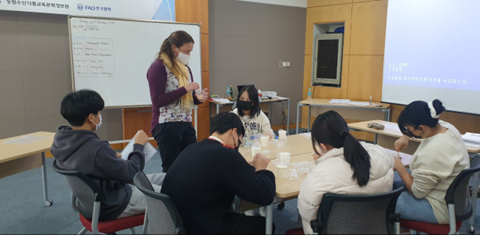
Teacher Christine Black leads the students in an experiment making slime. Photo credit: Korea FAO Association
Yoon Cho, Senior Manager of Korea FAO Association, said it was an experience the students will never forget.
“Well before the teachers arrived, they could feel their passion and enthusiasm for meeting students from rural areas in Korea. I would like to thank the New Zealand teachers who took time to visit Korea at the end of December, especially Christmas week, and made meaningful memories for middle and high school students in Korean rural areas,” Cho said.
School teacher Christine Black was excited for how her first visit to South Korea broadened her understanding of Korean culture.
“It was exciting to travel there to broaden my understanding of this culture as my high school has international students from South Korea. This definitely was a win-win situation to be able to travel somewhere new to me and also share our New Zealand culture.”
As part of the programme, each teacher was responsible for a couple of aspects of New Zealand. Black was responsible for sharing the life of a New Zealand high school student and introduce the different regions of New Zealand and their unique characteristics.
For Patsy Richardson, a teacher at Te Puke School, it was her first time in South Korea, and she introduced waiata to her homeroom group.
“I chose to teach the waiata ‘Tutira mai ngā iwi,’ with actions. We had three 30-minute slots in which to learn it and they had it perfected. Now whether that is because they are willing and diligent students, or I am such a fantastic teacher, is to be debated. The students also performed the waiata at the closing ceremony [for the programme] and it was a great display of cross-cultural connections,” Richardson said.
Despite the short time spent together, it was a great opportunity for the students and teachers to build relationships and cultural understanding between the two countries. The students in Korea were enthusiastic about speaking in English and enjoyed learning some Kiwi slang.
An intermediate school student, Kyungdon Joo, said he studied English and made new friends during the training which gave him a new perspective. “Now I have another goal: To go to New Zealand and learn more about New Zealand.”
For Elizabeth Henry, a teacher from the Auckland region, the English teaching programme was more than the opportunity to enhance language skills. Henry recognised the importance of being a cultural ambassador as she was one of the first New Zealanders the students had ever met.
“I was prepared to bring my best teaching practice to this opportunity prior to the trip not realising that once in Korea, the picture of my purpose there was so much bigger than I had anticipated. Not only did I bring my very best teaching practice to all the students I taught, my mindset changed, thinking one day these children will share this experience with their family and friends.”
Final reflections
Black reflected on the opportunity it provided for the New Zealand teachers as well as students.
“I think it is really important for teachers to grab opportunities like this, especially as there is more and more diversity in our classrooms, and it is important to get first-hand experience of other cultures.”
Henry summed up the English language teaching experience well. She hopes that whenever the students think of New Zealand “a happy memory pops into their mind from this experience.”
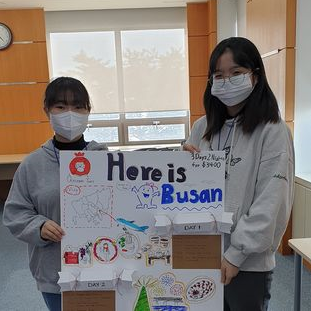
Students present their destination marketing posters Photo credit: Patsy Richardson
Education New Zealand Manapou ki te Ao would like to thank North Asia CAPE and regional education bodies for sharing the opportunity with contacts. This was a one-off overseas short-term teaching programme organised by the South Korean government. ENZ will continue to share these opportunities as they arise with education cooperation partners through the CAPE and regional education channels.
-
Growing New Zealand’s education connections in the Middle East
ENZ participated in the re-opening ceremony and stressed the importance of education connections between New Zealand and Saudi Arabia to a 300-strong audience.
A rousing performance of ENZ’s waiata – Manapou ki te Ao – by Ngāti Koraha, a kapa haka group based in Dubai, supported the embassy’s re-opening ceremony.
The event took place in the same week that University of Otago alumna, Rayyanah Barnawi, made the news as she is set to be Saudi Arabia’s first woman astronaut in space when she travels to the International Space Station later this year.
The visit was a useful opportunity to engage on education with Saudi Arabian government officials and to discuss G2G opportunities with NZ Inc agencies in the wider Middle East region.
ENZ’s Senior Advisor for the Middle East, Bronwyn Shanks, said the visit has been valuable in the way it has helped ENZ to lay the groundwork for an education delegation to the Middle East, including Oman, the United Arab Emirates, and Saudi Arabia in May.
“We understand the significance of the Middle East region for our education sector, particularly Te Pūkenga, universities, English language schools and edtech companies.
“We’re building knowledge and connections on the ground that can help open doors for New Zealand education providers looking to grow their links in the region and look forward to supporting them with a high-level education delegation visit.”
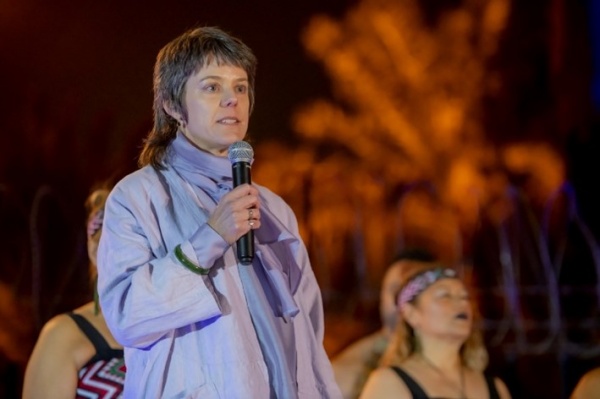
ENZ’s Bronwyn Shanks speaking at the New Zealand Embassy re-opening event, with Ngāti Koraha kapa haka group in support
Alongside the embassy’s re-opening event in Riyadh, ENZ and representatives from the University of Waikato and the University of Auckland met with Saudi government connections, including the National Institute for Educational Professional Development (NIEPD), Technical and Vocational Training Corporation (TVTC), Ministry of Culture, and Ministry of Tourism.
The discussions’ focus was on how New Zealand education providers could support Saudi Arabia’s efforts towards upskilling their young people under Vision 2030.
“It was great to meet some of those young alumni hosted by the University of Waikato and hear about the positive impact their New Zealand education experience continues to have now they are back in Saudi Arabia,” Shanks said.
ENZ and the University of Waikato also visited the University of Wollongong in Dubai, one of a network of study centres under university consortium NCUK, with which ENZ and all eight New Zealand universities have a partnership agreement to provide in-country foundation programmes.
Education providers interested in knowing more about education engagement in the region can contact ENZ’s Senior Advisor for the Middle East, Bronwyn Shanks, on bronwyn.shanks@enz.govt.nz.
-
Education New Zealand Manapou ki te Ao welcomes new Board Chair
The Minister of Education, Jan Tinetti, confirmed two new appointments to the Board of Education New Zealand Manapou ki te Ao on 17 March.
Tracey Bridges has been appointed Chair for a three-year term from 1 April 2023. She succeeds Steve Maharey who will finish his term at the end of this month.
Read the Minister’s announcement here.
In addition, two existing Board members have been reappointed. Dr Linda Sissons for a third term until 15 March 2024 and Daniel Wilson to a three-year term.
Tracey Bridges has knowledge of regional economic development, and expertise in strategy, risk, and reputation management, and in social marketing. She is Chair of the Wellington Regional Economic Development Agency Limited (WellingtonNZ), co-founder of The Good Registry and sets on the Boards of Sky Stadium, Whānau Āwhina Plunket, the Wellfed NZ Trust and the Digital Media Trust.
Dr Dona (Therese) Arseneau has been appointed as a member for a three-year term from 1 April 2023. Dr Arseneau also has knowledge of economic development including international education’s contribution to regional economic development, and governance experience in the tertiary sector at the Ara Institute and the Open Polytechnic. She previously chaired Regenerate Christchurch and Enterprise North Canterbury.
-
NZ Universities strengthen ties with Indonesia during LPDP Delegation visit to NZ
LPDP is an Indonesian Ministry of Finance agency responsible for funding Indonesian students to pursue further study both in Indonesia and abroad. Since its inception in 2013, LPDP has sponsored over 35,000 Indonesian students and during this time, has sent 177 scholars to study with New Zealand. LPDP scholars coming here have studied in a wide variety of areas, most commonly in the engineering (energy), environmental science, education, and business subject areas.
ENZ's Acting Market Manager, Indonesia and Malaysia, Naluri Bella, welcomed the delegation to New Zealand from 27-29 March and said it was a privilege to host members from the LPDP to NZ and further strengthen ties with Indonesia.
"During this visit, ENZ showcased the quality of New Zealand’s university system by securing engagements with all eight universities in three separate roundtable meetings in Auckland, Wellington and Christchurch.
"This gave each university the opportunity to profile their institution and highlight areas of collaboration. A NZ Inc. roundtable meeting was also held to discuss co-funding opportunities and to develop a closer government to government relationship.”
The LPDP visit followed a successful trip to see LPDP in Jakarta in October 2022 by the then New Zealand Minister of Education, Chris Hipkins. During this trip, Minister Hipkins relayed that New Zealand was ready to welcome back its international students and used the opportunity to advocate for all New Zealand universities to be included on the LPDP approved partner list.
Ben Burrowes, ENZ's Regional Director Asia, added that it was exciting to be able to welcome the LPDP delegation to our shores following Minister Hipkins’ visit and that by Universities New Zealand (UNZ) who had led a senior delegation throughout Southeast Asia including a visit to LPDP while in Jakarta in March 2023.
"We are very pleased to report that following LPDP's meetings with New Zealand's universities and earlier advocacy by the Minister and UNZ, LPDP confirmed that they will advocate for all eight universities to be included in their approved institution partner list. This allows all of our New Zealand universities to receive LPDP funded scholars in the future."
A nation-wide Memorandum of Understanding (MoU) with UNZ is also currently being developed to support the flow of students from Indonesia and New Zealand.
-
The new Study with New Zealand study matching tool is now live
Education New Zealand Manapou ki te Ao (ENZ) has launched this revamped study matching tool on the SwNZ website to replace the previous MyStudyNZ tool. It is a useful tool for Aotearoa New Zealand's education providers to be able to promote their courses to students online.
Geoff Bilbrough, ENZ’s General Manager of Marketing said that with the launch of the new StudywithNewZealand website, it was important to continue with the study matching tool as feedback from the sector had indicated it was a valuable tool for providers to connect with potential students and make them aware of the courses they offered.
"The sector told us that the previous matching tool, MyStudyNZ, had been positively received and tended to generate leads that were more engaged.
“We believe this new tool will continue to provide significant benefits to education providers and prospective students as it guides international students to study options that match their personal interests and past qualifications.
“To get the most out of the new tool, it is important that education providers’ profiles and course listings on the SwNZ site are up to date and accurate. This will help present your institution and your courses to the right students”, he added.
While ENZ does carry out a major data upgrade for all institutions twice a year (via our partner IDP), now is a good time to check your information is displaying accurately on our Study with New Zealand website. Education providers will have recently received an email with information on how to do this. It is a very straightforward process, and ENZ encourages providers to check their profiles and ensure that the name of your institution or school is correct and that your profile makes the most of all the features the system offers. Make sure your keywords are relevant and your profile includes full descriptions and photos to help you stand out to potential students.
Tertiary providers are being asked to check course study mode, start dates, costs, venue, and the duration as this information is used in the new study matching tool and the SwNZ search tool. The link to the admin platform to be able to check these details is available here: www.idp-connect.com/sign-in
If you did not receive this email, do not currently have access to the admin platform, or have any questions about the tool, you can email: info@studywithnewzealand.govt.nz.
A how to guide for tertiary providers has been developed and is available here.
- International photo round-up
-
NauMai NZ has a brand-new look
We are excited to share that NauMai NZ, ENZ’s student experience digital platform, has undergone a refresh and has a new look and feel, bringing it in line with the wider ENZ brand family. Check out its new look here.
NauMai NZ provides clear, timely information and advice about the things that international students want and need to know - arriving in New Zealand, study and education, health and wellbeing, New Zealand and Māori culture, exploring New Zealand, making friends, safety, money, work, and much more. It links to expert resources where appropriate and is designed to complement information provided by education providers.
NauMai NZ was launched four years ago and since then has had one million page views.
Student Experience Manager, Ross Crosson says the aims and objectives of NauMai NZ have not changed.
“NauMai NZ is still about providing trusted, accurate information to support student wellbeing, bridge the gap between expectation and reality, enable social connection, and improve student experience outcomes. The revamp is about being responsive to the needs of a wider range of students who are studying with New Zealand, not just in New Zealand” he adds.
Alongside the new look, new content has been added including,
- Life on campus (orientation, clubs, student associations)
- How to maximise your experience (goal setting and support options)
- Road safety
- Outdoor safety (including water safety, hiking and tramping, hunting/mahika kai)
- Online study for offshore students
- Global Pathways
“Just as we have over the past four years, we will continue to add new content to NauMai NZ to meet student need and expectation. The site is always evolving and feedback is welcome” Ross says.
Should you have any questions, please don’t hesitate to contact Ross, ross.crosson@enz.govt.nz.
-
Aotearoa welcomes New Zealand Schools Scholarships students from Viet Nam
14 high-achieving Vietnamese students will be arriving in Aotearoa New Zealand over the next few months to take up school placements across the country from Kerikeri to Upper Hutt, from Ōtūmoetai to Manawatū.
NZSS is the flagship initiative under the Aotearoa New Zealand School Sector Strategy in Viet Nam. It was launched in 2019 and is exclusively offered to Vietnamese students from Grade 8 – 10. Since its launch NZSS has grown to become a prestigious, top of mind scholarship for local students.
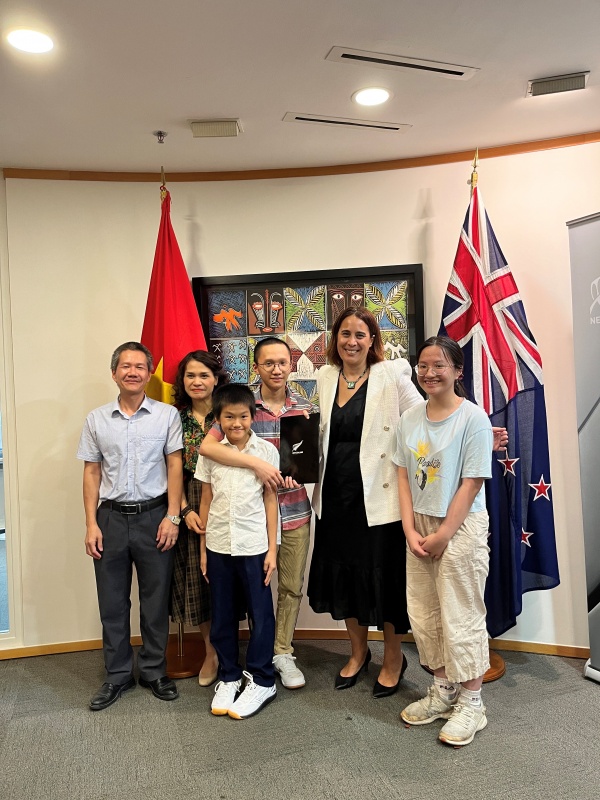
Nguyen Huy could not make it for the in-person Awards Ceremony in HCMC, so we arranged a special meet-up for his family at the Embassy in Hanoi with Ambassador Tredene Dobson, who awarded him with the NZSS certificate.
ENZ’s Business Development Manager, Mary Camp said that the scholarship programme not only offers talented Vietnamese students the opportunity to experience our country’s world-class education but also brings new perspectives and ways of thinking to Kiwi students as they learn alongside international friends.
“Schools in Aotearoa New Zealand are excited to welcome these top scholars from Viet Nam. Previous scholarship winners have had great academic success, made valuable contributions to their schools in NZ, and have gone on to attend top quality universities in NZ and internationally” added Mary.
This year’s award winners were celebrated at a ceremony on 18 June in Ho Chi Minh City where H.E Tredene Dobson, New Zealand Ambassador to Viet Nam opened the awards ceremony and pre-departure briefing and congratulated all the students.
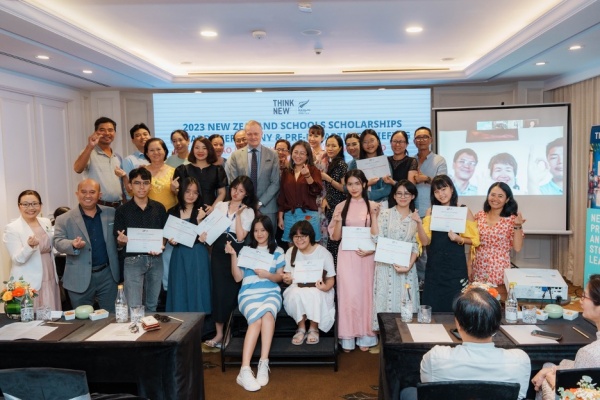
ENZ’s market manager Van Banh (far left) and Guy Lewis, Consular, NZ Embassy in Hanoi, with NZSS award recipients and family members at the awards ceremony and pre-departure briefing.
ENZ’s Regional Director for Asia, Mr Ben Burrowes also congratulated the students via video link and said it was fantastic to have a range of ex-scholarship winners and parents join us to share their tips and advice to this year’s winners.
“ENZ is absolutely committed to its relationship with Viet Nam and we are excited to welcome the NZSS recipients this year. The NZSS programme is designed so that more Vietnamese school students can access a world-class New Zealand education experience. As we saw pre-COVID, the NZSS recipients received the highest quality education and care while they were in New Zealand and that will certainly continue in 2023,” said Mr Burrowes.
A special thanks goes to the VSANZ - Vietnamese Students' Association in New Zealand for its President's presentation on the Pre-Departure Checklist and the NEW tips.
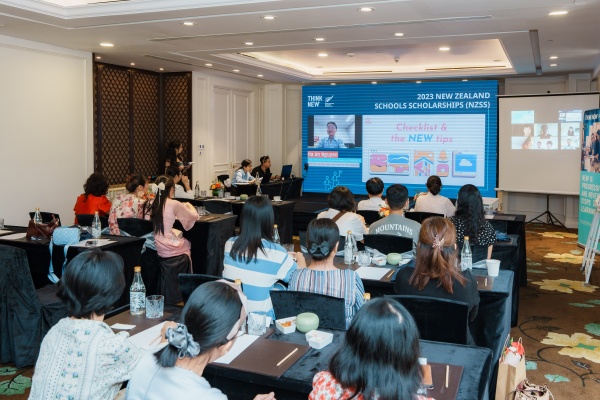
Ms Ha An Nguyen, President of VSANZ, shared useful tips for NZSS students to get well-prepared for the new learning journey in New Zealand.
We wish these students the absolute best for an exciting and rewarding study experience ahead as they start school across the country this week and in the coming months.
- International photo round-up
-
Summer holiday fun for Vietnamese students at the 2023 New Zealand Future Skills Camp
At this year’s camp, in addition to NZ EdTech Code Avengers which specialises in digital skills training, Education New Zealand Manapou ki te Ao (ENZ) also worked with another NZ Ed Tech company Chasing Time English, a digital platform that enhances English language learning through exclusive short films. Three local partners were involved to help promote and deliver training sessions for the students.
20 teams were shortlisted for the camps which ran from Saturday 24 June to Sunday 2 July 2023. The teams could participate in a variety of online and in-person group work and interactive activities, learning coding skills together with English skills for an intercultural environment. After the camps, the teams were required to work on a coding project themed “Making a creative and impressive 'Our Future Profile' Webpage introducing your team 15-20 years from now”.
The top eight teams with the most impressive webpages were then invited to present their products, in English, to a panel of judges on Sunday 16 July. The other teams from the 20 who were shortlisted were also invited to the Awards Ceremony held on Friday 7 July to receive certificates and announcement of the final results either in person or virtually.
His Excellency Mr. Scott James, New Zealand Consul General in Ho Chi Minh City, attended the Awards Ceremony. In his remarks, he said “All of the students here are already winners because you have not only surpassed many contestants to come this far, but you have also taken the courage to step out of your comfort zone and embark on this adventure to learn new skills.”
Assoc. Prof. Minh Nguyen, Head of Department Computer Science and Software Engineering at Auckland University of Technology, was one of the judges who evaluated the teams’ webpages and then the short-listed presentations. He commented: “It was an absolute pleasure to be a part of such an inspiring event. The creativity and innovation displayed by the teams was truly impressive.”
Ms. Karen Kemsley, Production Manager at Chasing Time English who taught students at online sessions, said: “I had a wonderful time with the NZ Future Skills Camp students. Everyone participated enthusiastically which made the classes both fun and engaging. They took every opportunity they could to share creative opinions and ideas while demonstrating excellent English language skills. They were an absolute delight!”
The 1st prize winning team, together with two 2nd prize winning teams went on to represent Viet Nam at the New Zealand – Asia Code Camp Day on 5 August with other students from Indonesia, Malaysia, South Korea and Thailand.
NZFSC not only provided an exciting and meaningful summer event for the participating students, but also left both students and their parents with a very positive impression of Aotearoa New Zealand as an innovative, welcoming and beautiful destination for their potential international education plans.

